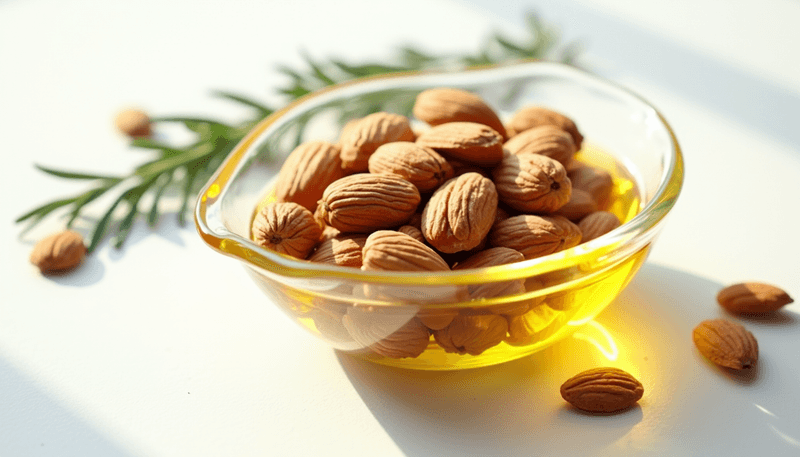Almond Oil: A Menopausal Woman's Best Friend?

As a woman approaching or experiencing menopause, you're likely familiar with the rollercoaster of symptoms that come with this significant life change. Hot flashes, mood swings, and cognitive challenges can make this transition feel overwhelming. But what if I told you that a simple, natural solution might be sitting in your kitchen cabinet right now?
Recent research published in the Journal of Herbmed Pharmacology (https://herbmedpharmacol.com/Article/jhp-44708) has shed light on the potential benefits of almond oil for menopausal women. This study, conducted on ovariectomized rats (a model that mimics menopause in humans), revealed some fascinating insights that could make a real difference in how we approach menopause management.
Let's dive into the key findings and explore how they might apply to your daily life.
Almond Oil: Your Heart's New Best Friend
One of the most striking findings of the study was the positive impact of almond oil on cardiovascular health markers. The rats treated with almond oil showed significant improvements in their lipid profiles – that's fancy talk for the levels of different fats in your blood.
Here's what happened: The almond oil reduced levels of "bad" cholesterol (LDL-C) and triglycerides while boosting "good" cholesterol (HDL-C). Why does this matter to you? Well, menopause often comes with an increased risk of heart disease, partly due to changes in these exact blood lipids.
Think of your cardiovascular system as a highway. LDL-C and triglycerides are like traffic jams, clogging up your arteries. HDL-C, on the other hand, acts like a street sweeper, clearing away the buildup. Almond oil seems to help keep this highway running smoothly.
So, how can you apply this insight to your daily life? Consider incorporating almond oil into your diet. Here are some practical ideas:
- Drizzle it over your morning oatmeal or yogurt
- Use it as a base for homemade salad dressings
- Swap it for other oils in baking recipes
"Could a spoonful of almond oil a day keep the cardiologist away?"
Remember, while these results are promising, they're not a replacement for any medications you might be taking. Always consult with your healthcare provider before making significant changes to your diet or supplement regimen.
Mood Boost in a Bottle
Another fascinating aspect of the study was the effect of almond oil on brain chemistry. The researchers found that almond oil treatment increased levels of important neurotransmitters like noradrenaline, dopamine, and serotonin in the brain.
Now, you might be wondering what this scientific jargon means for you. Let's break it down:
- Noradrenaline helps with focus and attention
- Dopamine is often called the "feel-good" neurotransmitter, associated with pleasure and reward
- Serotonin plays a crucial role in mood regulation and is often targeted by antidepressant medications
In essence, this cocktail of brain chemicals is like nature's mood stabilizer. Many menopausal women struggle with mood swings, irritability, and even depression. The potential of almond oil to positively influence these neurotransmitters could offer a natural way to smooth out some of those emotional bumps in the road.
How can you harness this potential mood-boosting power? Here are some ideas:
-
Create a calming bedtime ritual: Massage a few drops of almond oil into your temples before bed. The act of self-care combined with the potential benefits of the oil could help you relax and prepare for restful sleep.
-
Make an almond oil-based body scrub: Mix almond oil with sugar and a few drops of your favorite essential oil. Use this in the shower for a mood-lifting, skin-softening treat.
-
Try oil pulling: Swish a tablespoon of almond oil in your mouth for 15-20 minutes each morning. This Ayurvedic practice is said to have numerous health benefits, and it could be a simple way to incorporate almond oil into your daily routine.
"Is the secret to menopausal mood stability hiding in a bottle of almond oil?"
Remember, while these strategies can be helpful, they're not a substitute for professional help if you're struggling with severe mood issues or depression. Always reach out to a healthcare provider if you're concerned about your mental health.
Cognitive Clarity: Nourishing Your Brain
One of the most intriguing findings of the study was the potential neuroprotective effect of almond oil. The researchers observed that almond oil treatment helped maintain the structure of the hippocampus – a part of the brain crucial for memory and learning.
Many women report cognitive changes during menopause, often describing it as "brain fog" or difficulty concentrating. This research suggests that almond oil might help keep your cognitive functions sharp.
But how does this work? Almond oil is rich in vitamin E, a powerful antioxidant that protects brain cells from oxidative stress. It's also high in omega-3 fatty acids, which are essential for brain health. Think of almond oil as a protective shield for your brain cells, helping them stay healthy and function optimally.
Here are some ways you can incorporate this brain-boosting insight into your daily life:
-
Cook with almond oil: Use it for sautéing vegetables or as a base for stir-fries. The mild, nutty flavor pairs well with many dishes.
-
Make an almond oil-based brain-boosting smoothie: Blend almond milk, a banana, a handful of spinach, and a tablespoon of almond oil for a nutrient-packed drink.
-
Create a brain-healthy salad dressing: Mix almond oil with lemon juice, Dijon mustard, and herbs for a delicious dressing that's good for your brain and your taste buds.
"Could a dash of almond oil be the secret ingredient to a sharper menopausal mind?"
While these strategies can be beneficial, they're most effective as part of a holistic approach to brain health that includes regular exercise, mental stimulation, and a balanced diet.
In conclusion, this research offers exciting possibilities for managing menopausal symptoms naturally. Almond oil's potential to support heart health, stabilize mood, and protect cognitive function makes it a promising ally in your menopausal journey.
However, it's important to remember that while these findings are encouraging, they're based on animal studies. More research is needed to fully understand how these benefits translate to humans. Always consult with your healthcare provider before making significant changes to your diet or starting new supplements.
That said, incorporating almond oil into your diet is generally safe and could offer numerous health benefits beyond those specific to menopause. Why not give it a try? Start small – perhaps by swapping your usual cooking oil for almond oil in one meal this week.
Remember, menopause is a natural transition, not a disease. With the right tools and knowledge, you can navigate this change with grace and even find new ways to thrive. Almond oil might just be one more tool in your menopausal wellness toolkit.
So, dear reader, I challenge you: Pick one way to incorporate almond oil into your routine this week. Whether it's drizzling it over your salad, using it in a smoothie, or trying a relaxing temple massage before bed, take that first step. Your future self might just thank you for it.
After all, who knew that such a simple, natural oil could hold so much potential for menopausal wellness? It's a delicious reminder that sometimes, the most powerful remedies are the simplest ones.

Dr. Marcus Anthony Bennett
Dr. Marcus Bennett is a Seattle-based freelance medical writer and consultant specializing in mid-aged women's health. With a background in internal medicine and over a decade of experience in preventive care, he is dedicated to making complex health topics accessible. Dr. Bennett completed his MD at Johns Hopkins School of Medicine and residency at the University of Washington. His empathetic and evidence-based approach combines traditional medical expertise with a focus on health disparities, often incorporating practical lifestyle advice. Known for his clear, engaging communication, Dr. Bennett provides actionable insights to empower his audience.






